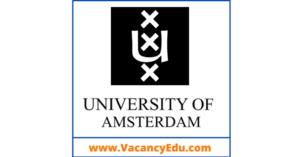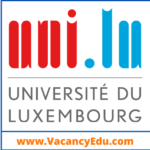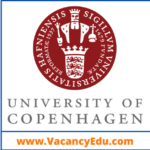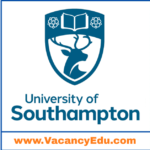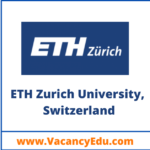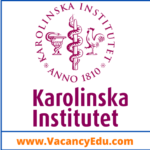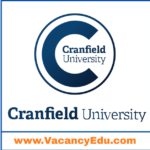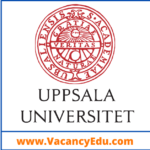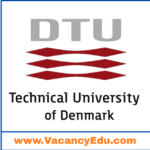University of Amsterdam, Netherlands invites online Application for number of Fully Funded PhD Degree at various Departments. We are providing a list of Fully Funded PhD Programs available at University of Amsterdam, Netherlands.
Eligible candidate may Apply as soon as possible.
(01) PhD Degree – Fully Funded
PhD position summary/title: PhD Position NWA project “ChangeAble; Accelerating Climate Action by Leveraging Behavioural Change”
Deadline : 15-3-2025
(02) PhD Degree – Fully Funded
PhD position summary/title: PhD in Entrepreneurship and Innovation
This PhD project investigates the synergies (and tensions) between innovation, commercial success, and subculture dynamics within the empirical settings of techno music and tech startups. Central to this inquiry is how cultural and structural mechanisms enable the techno subculture to shape entrepreneurial activity in tech startups—and the systems and processes behind this influence. Conversely, do the practices, norms, and values of tech entrepreneurship feed back into the artistic and communal dimensions of techno culture- and if so, through what pathways or modalities? This project explores these questions while also considering external factors such as market trends, technological advancements, and socio-economic conditions. Additionally, it examines how subcultures maintain their unique identities while fostering new ideas, driving innovation, and creating economic opportunities. The findings will provide valuable insights into the intersection of creative industries, innovation and entrepreneurship, highlighting the key role of subcultures in shaping vibrant and innovative ecosystems.
Deadline : 2-4-2025
View All Fully Funded PhD Positions Click Here
(03) PhD Degree – Fully Funded
PhD position summary/title: PhD Position in Literary Self-translation from and into Ukrainian
The PhD project is associated with an ongoing research project at ARTES about the translation activities of the Ukrainian writer and intellectual Ivan Franko (1856-1916). In your research, you will use Franko’s ‘self-translation’ activities as a base for a larger investigation into the history of literary self-translation as a multilingual and intercultural practice in Ukraine. It is a well-known fact that Franko wrote and published a large number of texts (including two novels) first in Polish and then translated them into Ukrainian or vice versa. He also translated some of his texts from and into German. Interesting questions you are going to research are: what is the motivation behind such self-translations against the background of the central or peripheral position of languages in the Danube monarchy? What translation strategies characterise this practice and what relationship exists in this respect between Franko’s self-translations and the rest of his translation oeuvre?
Deadline : 16-3-2025
(04) PhD Degree – Fully Funded
PhD position summary/title: PhD Position “Generative AI in Our Daily Lives: Unravelling the Trust-and-Use Calibration Dynamics”
The Amsterdam School of Communication Research (ASCoR) is looking for a highly motivated PhD candidate for the project “Generative AI in our daily lives: Unravelling the Trust-and-Use Calibration Dynamics.” This four-year PhD project, embedded within the Communication, Organizations and Society Program Group, will be supervised by dr. Floor Fiers, dr. Felicia Loecherbach, dr. Anne Kroon and prof. dr. Theo Araujo.
Hundreds of millions of individuals now interact with generative artificial intelligence (GenAI) in the form of conversational agents such as ChatGPT. Originally, GenAI attracted curiosity due to its ability to hold coherent conversations and generate credible text, images, and videos. Now, individuals integrate GenAI-agents to their routines, asking for recommendations, as productivity tools for work or school, or even as companions for emotional support. While useful, GenAI is not without risks and the adoption of this potentially useful, yet untested technology is a major societal challenge.
Deadline : 1-3-2025
(05) PhD Degree – Fully Funded
PhD position summary/title: PhD Position in Argumentation, Identity and the Public Sphere
In this research project, Expressing Identity in Public Discourse through Argumentation, argumentation is investigated as a mode of communication through which people can present themselves and others in interactions. Although argumentation may have many functions, among which particularly its function in persuasion and building consensus is well-established, the use of argumentation to express identity and social relationships has to be studied in more detail.
In the field of language and social interaction, identity and the presentation of self has been a central concern and various theories have been developed to understand how utterances are used to position oneself and one’s interlocutor. In the context of public discussions, argumentation is used not only to convince others, but also to position oneself or one’s group within a larger public sphere. The processes of creating groups and projecting relationships and hierarchies are central to public argumentation and are deeply intertwined with identity concerns. It is these arguments, not necessarily or exclusively meant to convince anyone in a difference of opinion, which are the focus of this project: arguments which may project attitudes, relationships and social status.
In this project, the PhD will collaborate with the principal investigator to connect literature on communication and identity to argumentation theory, resulting in an analytic model for empirical analyses that has clear links with current research in argumentation theory. The researcher will primarily focus on connecting insights in (interactional) sociolinguistics, linguistic anthropology and/or discourse/conversation analysis to the field of argumentation theory, and can develop these connections on a case study of their choice. The researcher compiles their own corpus and designs their own study within the scope of the project. In particular, this project starts from the premise that argumentation can be highly productive in creating an in-group and feelings of belonging, particularly in the public sphere. The researcher is expected to contribute with their project to the study of communication in the public domain.
Deadline : 15-4-2025
Polite Follow-Up Email to Professor : When and How You should Write
Click here to know “How to write a Postdoc Job Application or Email”
(06) PhD Degree – Fully Funded
PhD position summary/title: PhD Position in Algorithms/Algorithmic Game Theory
Do you want to explore the power and limits of algorithms for modern-day applications, contributing to a sound theoretical foundation to the machine-made decisions that have become central in practically all parts of our life and society?
A PhD position is available at the Theoretical Computer Science group at ILLC, University of Amsterdam. The position’s focus is on algorithms under uncertainty and encompasses topics e.g. from Algorithmic Game Theory, Social Choice, Online Algorithms, and Fair Allocation. We tackle a variety of central, modern-day applications by providing new algorithmic approaches and proving their performance guarantees, but also e.g. investigate algorithmic restrictions posed by specific settings, and how to best capture the quality of an algorithm.
Deadline : 4-3-2025
(07) PhD Degree – Fully Funded
PhD position summary/title: PhD position in selective neuronal vulnerability in FTD and ALS
This project aims to better understand the selective vulnerability of neuronal populations in amyotrophic lateral sclerosis (ALS) and frontotemporal dementia (FTD). You will study this using human post-mortem tissue of donors with ALS and FTD. Specifically, you will investigate the biochemical properties of two specialized neuronal populations, the von Economo neurons and the Betz cells. You will use techniques such as immunohistochemistry, in situ hybridization, laser capture microscopy, proteomics and RNA sequencing. This project is part of the Selective vulnerability research line headed by Dr. Anke Dijkstra. The research line is embedded in the Molecular Neuroscience Group at the Swammerdam Institute for Life Sciences (SILS, Faculty of Science). You will be supervised by Dr. Anke Dijkstra and Dr. Lars van der Heide.
Deadline : 24-2-2025
(08) PhD Degree – Fully Funded
PhD position summary/title: PhD Positions, Project ‘Spatiotemporal Reconstruction of Interacting People for Perceiving Systems’
Deadline : 17-2-2025
Click here to know “How to Write an Effective Cover Letter”
(09) PhD Degree – Fully Funded
PhD position summary/title: PhD Candidate Microbial Host Preference in Plant Stress Resilience
Plant roots accommodate one of the most diverse, yet vastly neglected, microbial communities on earth. This plant microbiome provides several beneficial functions to its host. The aim of the research consortium Microbial Imprinting for Crop Resilience (MiCRop), funded by the Dutch Research Council (NWO), is to harness the genomic potential of root-associated microorganisms as a new platform for improved stress resilience of future crops and sustainable food production. As part of these research efforts, we explore the importance of microbial host preference for stress alleviation on a set of different plant species. This adds crucial information to our understanding of how and in which environment these microorganisms will be most successful. It has thus strong implications on the development of biologicals as alternatives to chemical pesticides. For this project, we are looking for an enthusiastic PhD candidate who will perform controlled laboratory and greenhouse experiments followed by microbial metabarcoding, metatranscriptomics, root metabolomics, and plant phenotyping to determine the differential impact of microbial communities on the host’s ability to cope with biotic stress. You will work with the model plants Arabidopsis thaliana and Lotus japonicus, and the crop species tomato, cabbage, and pea, as well as with unique bacterial culture collections that you will use to design host-specific synthetic communities (SynComs).
Deadline : 1-3-2025
(10) PhD Degree – Fully Funded
PhD position summary/title: 2 PhD positions “Digital Geographies of Urban Drug Markets in Amsterdam and Rio de Janeiro”
The PhDs in this project will study such shifts and how they connect to differentiated exposure to harm across urban spaces and populations, asking: How does the uptake of digital technologies in drug dealing transform uneven urban landscapes of risk? Focusing on micro-transactions in illicit drugs, the project aims to understand the everyday digital geographies of the illicit urban economy. Specifically, it seeks to understand how drug dealers and consumers experience unequal and shifting risks – including the risk of problematic substance use and exposure to criminal or state violence – as mobile, digitally‐enabled deliveries replace place‐based sales.
Deadline : 2-3-2025
Connect with Us for Latest Job updates
(11) PhD Degree – Fully Funded
PhD position summary/title: PhD Position in Archives of Deep Learning
The European Research Council-funded Advanced Grant ‘Deep Culture – Living with Difference in the Age of Deep Learning’ invites applications for a PhD position to research the intersections between deep learning and cultured. Collaborating with two other PhD students,two PostDocs and a team of other PhD students, the aim is to realise an ambitious interdisciplinary research agenda conceptualizing, analysing and transforming the relations between deep learning and culture. The project involves experts from the Institute for Logic, Language, and Computation (ILLC), the Amsterdam School for Cultural Analysis (ASCA), and the Amsterdam School for Heritage, Memory, and Material Culture (AHM). Your research will be part of the AI in Culture and Society group of the ILLC and the Critical Data and AI group at Media Studies. We are looking for a talented, ambitious PhD candidate who can combine independent research with team collaboration. You will have the opportunity to explore exciting questions of digital culture, archival collections, and deep learning. You willcontribute to shaping debates about our relations with AI technologies.
Deadline : 20-2-2025
Polite Follow-Up Email to Professor : When and How You should Write
(12) PhD Degree – Fully Funded
PhD position summary/title: PhD positions in animating metamaterials
This unique research opportunity revolves around the fields of active matter, metamaterials and robotics, combining experimental, numerical, and theoretical approaches. The primary focus of the project lies in investigating various aspects, such as non-reciprocity in soft matter, topology, instabilities, odd viscosity and elasticity, and pattern formation within metamaterials.
The specific research project will be custom-tailored to align with the interests and expertise of the successful candidate, fostering a collaborative and fulfilling environment. Together, we will mutually agree on the direction of the research, ensuring it aligns with your passion and aspirations.
Deadline : 1-4-2025
(13) PhD Degree – Fully Funded
PhD position summary/title: PhD Position in Social Psychology: Experience, Perceptions, and Consequences of Microaggressions
We are seeking a PhD candidate for a 4-year project on microaggressions. This PhD track is embedded in the Social Psychology programme group, consisting of a vibrant group of world-renowned researchers studying intergroup relations, culture and emotion. The desired starting date is May 1st, 2025, with some room for negotiation.
Deadline : 10-2-2025
(14) PhD Degree – Fully Funded
PhD position summary/title: PhD Candidate Law – Generative AI in the Media
The overall goal of this project is to study the role and implications that the new regulatory framework has in realising public values and influencing the power dynamics and legal relationships in the context of the development and use of generative AI models and systems in the media context, with a focus on AI-generated illegal and harmful content. Particular questions we are interested in are:
From a legal perspective, how does the emerging regulatory framework organize the roles, responsibilities, ownership and relationship between media, platforms and AI providers in the context of generative AI content that is illegal or harmful? How does this framework rely on co- and self-regulatory approaches, like the Code of Practice on GPAI?
Does this framework provide a consistent regulatory approach to governing generative AI in the Media? How does it deal with issues of ownership of data, trade secrets, technology and illegal/harmful content, especially as regards generative AI? How are generative AI content moderation and enforcement regulated? What types of conflicts and trade-offs does this regulatory framework result in?
What can we learn from how this regulatory framework tackles generative AI vis-à-vis illegal and harmful content?
Can specific case studies in the areas like copyright, disinformation or AI-generated content moderation inform our understanding of regulatory trade-offs and the public values involved?
Is this normative framework adequate to address the convergence of generative AI with large platforms and search engines? What are the implications of this convergence from the perspective of different EU legal instruments (e.g. AI Act, DSA, Copyright Directive) and different regulatory solutions (e.g. transparency and accountability)?
Deadline : 18-2-2025
(15) PhD Degree – Fully Funded
PhD position summary/title: Fully-Funded PhD Position in Human-Computer Interaction with a Focus on Audio Design and Perception
Deadline : 4-3-2025
(16) PhD Degree – Fully Funded
PhD position summary/title: PhD Position in Secure Multi-party Computation
Cryptography today is about much more than just securing communication—it is also a powerful tool for enabling private computations. Secure Multi-Party Computation (MPC) is an exciting field that bridges privacy and data utility, allowing multiple parties with private inputs to perform joint computations without revealing their individual data. This technology has far-reaching implications across industries, from healthcare to finance, empowering secure and privacy-preserving data analysis.
We are looking for a PhD student to join our team and contribute to cutting-edge research in theoretical computer science, with a focus on Secure Multi-Party Computation. You will join the Theory of Computer Science group at the Informatics Institute.
Deadline : 16-4-2025
About University of Amsterdam, Netherlands –Official Website
The University of Amsterdam is a public research university located in Amsterdam, Netherlands. The UvA is one of two large, publicly funded research universities in the city, the other being the Vrije Universiteit Amsterdam (VU). Established in 1632 by municipal authorities and later renamed for the city of Amsterdam, the University of Amsterdam is the third-oldest university in the Netherlands. It is one of the largest research universities in Europe with 31,186 students, 4,794 staff, 1,340 PhD students and an annual budget of €600 million. It is the largest university in the Netherlands by enrollment. The main campus is located in central Amsterdam, with a few faculties located in adjacent boroughs. The university is organised into seven faculties: Humanities, Social and Behavioural Sciences, Economics and Business, Science, Law, Medicine, Dentistry.
The University of Amsterdam has produced six Nobel Laureates and five prime ministers of the Netherlands. The University of Amsterdam has been placed in the top 100 universities in the world by five major ranking tables. By the QS World University Rankings it was ranked 61st in the world, 14th in Europe, and 2nd in the Netherlands in 2021. The university was placed in the top 50 worldwide in seven fields in the 2011 QS World University Rankings in the fields of linguistics, sociology, philosophy, geography, science, Economics and econometrics, and accountancy and finance. In 2018 and 2019 the two departments of Media and Communication were commonly ranked 1st in the world by subject by QS Ranking.
Disclaimer: We try to ensure that the information we post on VacancyEdu.com is accurate. However, despite our best efforts, some of the content may contain errors. You can trust us, but please conduct your own checks too.
Related Posts
- PhD Degree (20) -Fully Funded at Luxembourg, Luxembourg

- PhD Degree (23) -Fully Funded at University of Copenhagen, Denmark

- PhD Degree (31) -Fully Funded at University of Southampton, England

- PhD Degree (24 )-Fully Funded at ETH Zurich, Switzerland

- PhD Degree (13)-Fully Funded at Karolinska Institute, Sweden

- PhD Degree (11) -Fully Funded at Cranfield University, England

- PhD Degree (34) -Fully Funded at Newcastle University, England

- PhD Degree (19) -Fully Funded at Uppsala University, Sweden

- 25 PhD Degree-Fully Funded at Technical University of Denmark (DTU), Denmark


